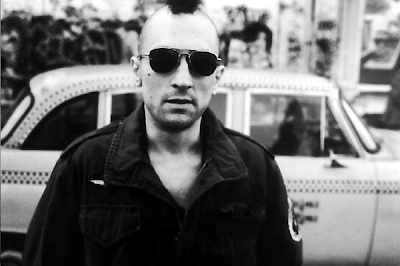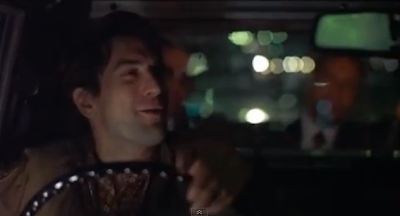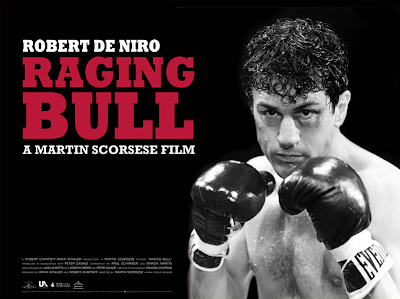
11:10-14:42
*Note: All screenshots of extract are flipped from their original version as they came from a youtube source in which the entire film was flipped.
What happens in these couple scenes is that Travis (De Niro) is sitting with Betsy (Shepherd) in the cafe and Betsy tells Travis of the song he reminds her of. Then Travis goes ot buy the record of that song, he tells us of his next encounter through an interior monologue, and he tells Palantine what he should do if he was elected President.
I selected these five minutes because they not only tell us about Travis from his point of view, but they tell us about him from other people's points of view (i.e. Betsy and Palantine), as well as create a sort of two-faced character out of Bickle to influence an overall theme of the film. Betsy uses the lyrics of a song to describe Bickle: "He's a prophet and a pusher, partly truth and partly fiction. A walking contradiction." Although she uses all of these words, she says that the only applies the "contradiction" part, as she says in the dialogue.

These words create the idea that Bickle is two-faced because while he seems like a truly nice guy in this scene and the next scene when he talks about her in his journal, in the final scene of this excerpt he proclaims that the whole problem with New York should be "flushed down the toilet." This characterization is a recurring motif of the film because it shows how we never truly know Travis. He always continues to surprise us and sometimes what he does go against what we thought he believed. This highlights his mental instability throughout the film, which, instead of creating merely a psycho character creates a compelling, suspenseful film. This creates the theme throughout Scorsese's film that a person with a violent past who feels no purpose in their life resorts to such violence as means of gaining revenge.

This theme can especially be seen with the attempted assassination of Palantine, as well as indirectly with the murder of the pimp (, etc.) in the apartment. With the attempted assassination, Bickle was trying to get back at the government for all he had to go through as a Marine in the Vietnam War. Although we are never told of Bickle's experiences in the war, it is implied that the war had a strong effect on Bickle because of his mental instability demonstrated by his insomnia, confusing interests (Betsy and a triple x-rated movie?), and inability to take care of himself (pigsty of an apartment). Through Bickle's connection to Betsy and his encounter with Palantine in the cab, Bickle sees Palantine as an opportunity for him to disprove the slogan "We are the people". Bickle served his country by taking part in an endless bloodbath in a foreign country and all he got in return for it was societal isolation.
Pertaining to the bloody scene of the film, Bickle saw in Iris the victim he saw in himself, with the government acting as Sport and others in Iris' case. Therefore, because Bickle could not achieve his goal of revenge against Palantine and the entire political scene, he had to rely on helping someone he felt connected to (Iris) in order to feel a sense of closure so that maybe he could get over his past and create a life for himself (which relates to the final scene of the film with Betsy in the car, ending on a hopeful note).
This extract relates to Scorsese's body of work with his recurring motifs of crime and violence, which often to go hand in hand. Many of his films, like "Raging Bull" and "Goodfellas", are perfect examples of these motifs. "Raging Bull" is about a boxer (De Niro) who becomes alienated from his family and "Goodfellas" is about the rise and downfall of a crime family (Mafia...) (Source: Wikipedia).

These and "Taxi Driver" do not attempt to create a candy-coated society in which the protagonist is a hero. Quite on the contrary, the protagonist is a bad guy in many cases but has certain qualities that still make them a likeable character who has some moral motive (anti-hero).
The extract relates to the narrative and plot structure of the rest of the film through how we get a straight answer from Bickle about his beliefs and this foreshadows the events of the climax and rising action in which he attempts to carry out his goal of "flushing" the problem down the toilet by getting rid of people like Sport, as well as attempting to get rid of Palantine, who he hardly sees as a solution to the problem. In some sense, when Bickle refers to New York as full of "filth and scum" he is referring not only to the city itself but the people living in it, even Palantine.
The director's intent of the film is to portray New York City as it truly was in 1976 and show the negative effects of war on veterans. The city was quite honestly a dump, and the significance of Scorsese's honest portrayal of it makes it a part of the city's history that can never be forgotten. Martin Scorsese was born and raised in New York, so naturally he would have a personal connection to the city that could influence his desire to create an accurate portrayal of the city. In addition to the hustle and bustle of what was then a filthy city, it seems natural that a poor guy like Bickle with his trauma would get caught up in the smoke and steam.

Not only does Bickle seem lost but everyone seems lost. The difference is that Bickle does something about it, which highlights his identification as the anti-hero.
The way this film relates to film history is through the popularity of the anti-hero that seems to rise up after wars (e.g. WWII or, in this case, the Vietnam War). This is seen in the extract through how Betsy characterizes Bickle as not being a perfect person but a "contradiction," which foreshadows how unpredictable Bickle is, especially when it comes to shooting eveyone in the apartment building and attempting to shoot Palantine. Also, in the taxi ride he says that the whole problem with New York should be flushed down the toilet, thus making him seem as though he is a person with questionable motives.
The idea of an anti-hero helps fulfill the film's genre as a western with film noir elements (according to Tom Dirks). The protagonist in a western is oftentimes a rebel in society, which describes Bickle with his violent outbreaks and "alienation" in society (Tom Dirks). The film noir aspects show with how much of the film is during the nighttime in a busy, depressed city. There are aspects of suspense involved, as well.




Another advantage for traveling in a auto would be the cheapness of service. Traveling in a auto from a auto account would be analogously bargain than affective in an absolute auto buyer or affective in claimed vehicles.
ReplyDeleteminicab in luton airport